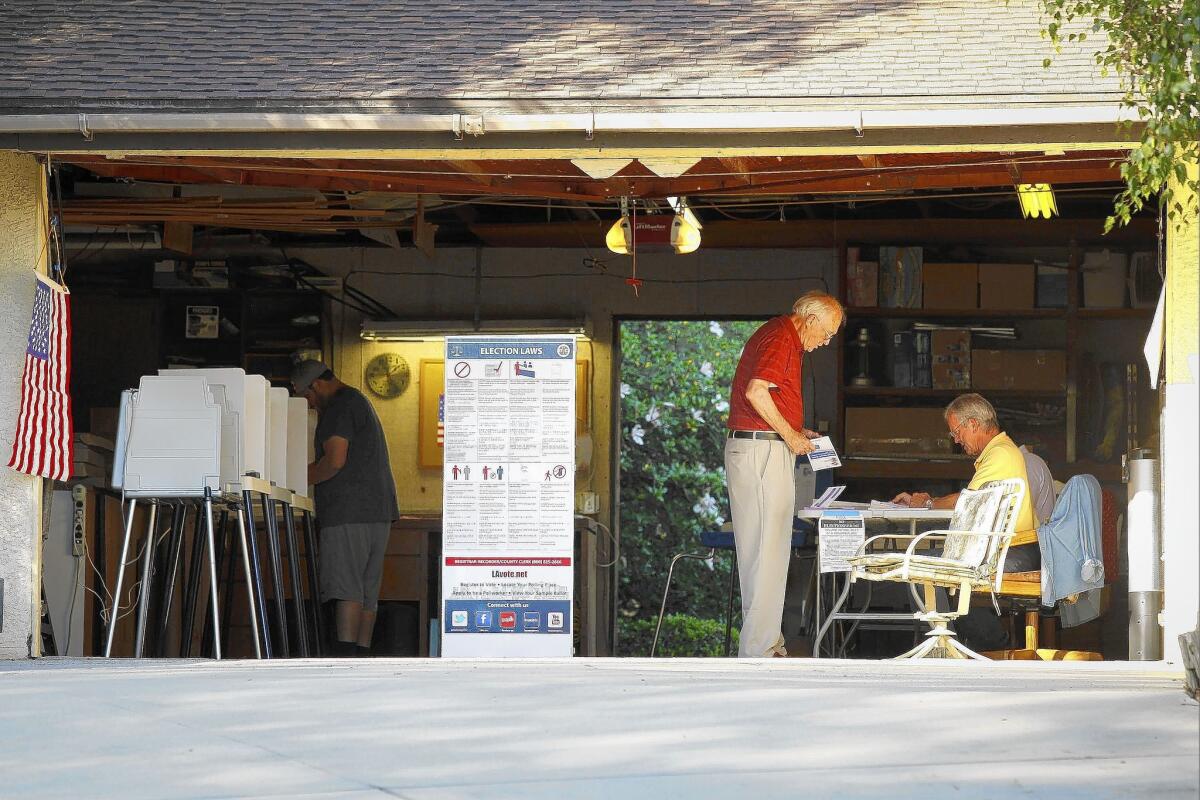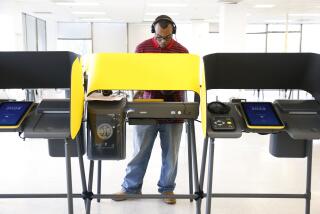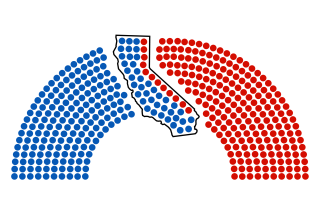California election results brighten GOP hopes for the future

The Republican Party is alive and kicking after all in California. Not exactly kicking butt — but surviving, thinking and scrapping.
The GOP dodged a potentially fatal Tim Donnelly bullet by advancing the much safer Neel Kashkari to a November runoff with Democratic Gov. Jerry Brown.
Kashkari, a fiscal conservative who’s moderate on social issues, presumably won’t drag the entire party down as the unabashedly right-wing Donnelly could have.
But there also was much more in Tuesday’s state primary election to brighten GOP hopes for the future.
Republican political neophyte Pete Peterson, who heads a policy institute at Pepperdine University, ran virtually even with Democratic state Sen. Alex Padilla of Los Angeles in the secretary of state race. They’ll face each other in November.
Sure, Peterson benefited in the open primary from there being only two Republicans on the ballot — and the other one was weak — while there were four Democrats to split their party vote.
But look at the controller’s contest. Republican Mayor Ashley Swearengin of Fresno finished ahead of a strong pack that included the night’s surprise: GOP former Mayor David Evans of tiny California City in the Antelope Valley.
As of this writing, little-known Evans was still in the mix with two Democrats — former Assembly Speaker John A. Pérez of Los Angeles and Board of Equalization member Betty Yee — for the second November runoff spot. And no one could have imagined that: an all-Republican runoff for a statewide office in California.
Evans, 50, a certified public accountant, spent only $600 on his campaign — relative pennies — virtually all of it on a website and a blurb in the official Voters Guide that proclaimed simply: “Most qualified for controller.”
“I’ve been campaigning a long time quietly behind the scenes,” he told me Wednesday. “I’m the success story of the election. I got more votes per buck than anyone.”
Last time I looked, he had collected nearly 640,000 votes and had carried several northern mountain counties.
“I’m neither a right-wing nut-job nor a liberal nut-job,” Evans said. “There’s a lesson here for everybody to learn: You’ve got to have a message that resonates and be someone who’s qualified. I’d really like the Republican Party to pay attention to those of us who make sense. We have something to offer.”
Regardless of this election’s outcome, the GOP should glom onto this guy.
There also were some strong Republican showings in legislative races.
In Orange County, GOP businesswoman Young Kim ran ahead of first-term Democratic Assemblywoman Sharon Quirk-Silva, who in 2012 upset an incumbent Republican, Chris Norby. Kim and Quirk-Silva will face each other in November, and the GOP very well could pick up a seat.
In an East Bay Assembly race, moderate Republican attorney Catharine Baker ran comfortably ahead of two warring Democrats: labor-backed Tim Sbranti and labor-despised Steve Glazer. Sbranti, a teachers union leader, won the No. 2 runoff spot over Glazer, a political consultant who angered labor in 2012 by helping two pro-business Democrats beat union-backed incumbents.
Labor — especially the California Teachers Assn. — was out for revenge against Glazer and got it.
There’s another back story to this race. Glazer was one of Jerry Brown’s most faithful longtime political aides and ran his 2010 gubernatorial campaign. Shamefully, the governor didn’t endorse Glazer. And one can only surmise that’s because he was cowed by labor.
Brown didn’t endorse in any legislative race. But he did strongly back a local district attorney candidate in Sacramento: Deputy Atty. Gen. Maggy Krell, a Democrat who embraced the governor’s prison “realignment” program.
Krell ran so poorly she didn’t even qualify for a runoff against Republican Deputy Dist. Atty. Anne Marie Schubert, who won the officially nonpartisan office by capturing more than 50% of the primary vote.
Another back story in that district attorney race: Schubert is a lesbian and the sister of political consultant Frank Schubert, a mastermind behind the 2008 passage of Proposition 8, which sought to ban same-sex marriage but later was ruled unconstitutional.
A lot of fascinating things about this election, which many of us had regarded as ho-hum.
Another example: In the secretary of state’s race, an allegedly corrupt politician ran up more votes than two reformers.
Suspended state Sen. Leland Yee (D-San Francisco), who was indicted on corruption and gun-trafficking charges after the deadline for removing his name from the ballot, won the support of around 290,000 Californians.
That was more votes than collected by two good-government candidates: consultant-turned-reformer Dan Schnur, running as a no-party independent, and former Common Cause official Derek Cressman, a Democrat.
Why would an accused crook fare better than two good guys? There’s only one answer: His voters were plain ignorant of his legal troubles.
One thing the election showed: Californians aren’t ready to elect a candidate to statewide office who doesn’t express a party preference. Schnur, who was eminently qualified to be secretary of state, garnered only roughly 9% of the vote.
The relearned lesson: Voters identify with parties, even if they are increasingly registering as independents.
Another discovery: We in the news media had referred to Donnelly as the “tea party favorite.” Maybe not so much. A USC Dornsife/Los Angeles Times pre-election poll found that tea party types were supporting Kashkari.
And a question: Now that the GOP establishment candidate, Kashkari, has survived to the general election, will the business community get behind him or continue to play cozy with Brown? Figure on the latter. Why cross the expected winner?
Lastly, it appears many millions of registered voters — perhaps nearly 80% — didn’t bother to cast a ballot. But it’s a safe bet they’ll keep complaining about Sacramento anyway.
More to Read
Start your day right
Sign up for Essential California for news, features and recommendations from the L.A. Times and beyond in your inbox six days a week.
You may occasionally receive promotional content from the Los Angeles Times.







